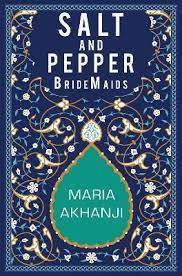

The description of Salt and Pepper, the second of three books in Maria Akhanji’s rendering of Bangladeshi Muslim life in East London, filled this reader with promise. It created an expectation for insight into a little-known culture - a written equivalent to FX’s Rami, which, with humor and bravery, explored life as a young Muslim amidst a sea of ignorance to your cultural practices.
In contrast to Rami, which in this reviewer’s opinion, should be compulsory consumption for every non-Muslim, this book, unfortunately, offers little in the way of a compelling narrative. Instead, readers are asked to wade through 400-plus pages of mundane descriptions of the everyday experience of the book’s narrator, Ranya. Though this young Muslim woman confronts multiple significant experiences and hardships, including an arranged marriage, moving to the groom’s household, and a weak-minded husband, the reader receives inadequate space to ponder these important dilemmas.
Instead, the insistent rounds of large-scale cooking, pedantic cleaning routines, and casual emotional abuse encountered by this character lose their significance because these descriptions are banal and repetitive. As a narrative tool, this descriptive repetition may possess value. Unfortunately, here it does not. And when the narrative opens to include other characters’ reflections on Ranya’s experience, this remains far too cursory and dismissive.
Because of custom Ranya moves into the (unpalatial) five-bedroom home of her in-law Amma and Abba (the Bengali Muslim terms for mother and father, respectively) surrounded by five sisters-in-law, three of which despite living outside the family home return almost daily. Of this extended cast of characters, none receive any meaningful rendering. We do not learn of their experiences that could inform their behavior toward Ranya. The author misses exploring these further, as with Ranya’s mother-in-law, who it is hinted at, has experienced a not entirely dissimilar experience with the lead character through her own arranged marriage. We see that Fahim, Ranya’s new husband, lacks the willpower to stand up to his parents or challenge his sisters’ behavior toward Ranya. We also learn Fahim is not overly interested in sexual relationships with Ranya. But only on page 421 of 422, and then only through a throwaway line, “Some ‘men’ prefer wearing bangles,” is his possible homosexuality explicitly referenced.
Too many of these interesting threads wither on the vine before coming anywhere near maturation. A few of these include the eulogizing of white converts and their simultaneous dismissal among other Muslims; the stigma of divorce and the importance of social class among this group, and the big questions such as arranged marriage and inter-personal relationships between Muslims in Modernity follow a similar fate.
Another oddity of the work is the narrative shift on page 419, which, until this point, has remained entirely in the first person, through Ranya’s eyes. Without good reason, we move to the third person. In the subsequent chapter first person again takes over. Maybe this narrative refocus is intentional. However, for this reader, the reasoning remains not forthcoming.
Salt and Pepper possess occasional nice flourishes of prose, as with: “I looked wistfully at the window, which had water droplets on its pane. The light from the lamp posts made them glisten, turning it into a snippet of the galaxy,” and, “I stopped as he blocked my way. We were by a park where the moonlit evening spoke the accents of a gentle breeze and distant urban sounds. Nature was about to do the first take of our first fight.” Another of the book’s favorable factors is the rendering of place. Not the geography of this corner of East London, which can still be more pronounced, but language. These characters remind me of where I spent the first forty years of my life.
If ignorant of Muslim culture, this book may help shed light on that world. Although I believe better examples exist, most notably Rami, as mentioned earlier. If you appreciate patterns of local language, this offers another plus in the book’s favor. Outside of these positives, however, this reviewer found little to hold their attention.